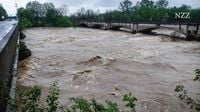Severe weather conditions have wreaked havoc across the Wallis region of Switzerland and parts of northern Italy, leading to significant disruptions and safety concerns as heavy snowfall and rain continue to impact local communities.
As of Friday, April 18, 2025, the Simplon Pass has reopened at 16:30 for traffic, bringing some relief to stranded travelers. However, many areas, including Zermatt, remain without power and are effectively cut off from the outside world due to the extreme weather conditions.
In the past few days, the Wallis region experienced unprecedented snowfall, with reports indicating that up to 100 centimeters of snow fell in higher elevations, such as the Grosser St. Bernhard, while lower areas like Visp recorded about 30 centimeters. The heavy precipitation has led to the declaration of a "special situation" by the Wallis State Council, allowing authorities to respond swiftly to emergencies.
On Thursday, April 17, the region was hit hard, with a significant power outage affecting several municipalities in the Saastal and Mattertal areas. Local residents were advised to stay indoors, especially in regions where trees and bodies of water posed danger due to the risk of avalanches and falling branches. Romy Biner Hauser, the mayor of Zermatt, emphasized the importance of safety, stating, "Moving outside the village is life-threatening." Many residents were left without electricity, and emergency shelters were set up to provide food and charging stations for mobile devices.
Travelers in the area faced substantial challenges as well. A group of retired tourists from southern France found themselves stranded in Brig after their plans to ride the Glacier Express were thwarted by the weather. Marie-Christine, one of the travelers, expressed disappointment, saying, "We are sad and disappointed. We came all the way from the Drôme region to experience this, and now everything has changed." Meanwhile, a couple from Hong Kong and a family from England also reported being stuck in Visp, struggling to find accommodation as local hotels filled up quickly.
In addition to the severe weather in Switzerland, northern Italy has also been significantly affected. In Monteu da Po, near Turin, a 92-year-old man drowned when water and mud engulfed his home. The region has seen heavy rainfall, leading to flooding and dangerous conditions that have prompted authorities to close roads and issue warnings to residents.
Back in Wallis, the Matterhorn Gotthard Bahn reported ongoing disruptions, with the route between Visp and Zermatt expected to remain closed until at least Saturday, April 19. This left many tourists unable to reach their destinations, with some expressing frustration and uncertainty. Nick, a tourist from England, remarked, "I’ve been coming to Zermatt for 30 years, and I’ve never seen weather like this in April. We’re just hoping to get there safely."
On the ground, emergency services have been working tirelessly to clear roads and restore power. Over 500 firefighters and 170 personnel have been deployed to manage the situation, with continuous efforts to assess and repair damage to the high-voltage network. Cedric Schmidhalter, a regional emergency chief, assured the public that they were prepared for the storm, stating, "We were ready for the bad weather, and we are working hard to restore services as quickly as possible."
Despite the challenges, the community has shown resilience. In Bellwald, one resident shared a lighthearted moment amidst the chaos, recalling how they brewed coffee using a fondue pot during a brief power outage, saying, "We had no power for a few hours, but we managed to make the best of it. Luckily, it was daytime, so we didn’t need candles."
The weather is expected to improve over the Easter weekend, with forecasts predicting clearer skies and rising temperatures. However, the aftermath of the storm will likely continue to affect travel and daily life in the region for some time. Local authorities urge residents and visitors alike to remain cautious and heed safety warnings as they navigate the recovering landscape.
As the situation develops, residents are reminded to stay updated on weather alerts and travel advisories, particularly as the risk of avalanches and further disruptions remain a concern. The Wallis region, known for its breathtaking landscapes and outdoor activities, is currently facing a challenging period, but with community support and resilience, it will recover from this harsh winter weather.







